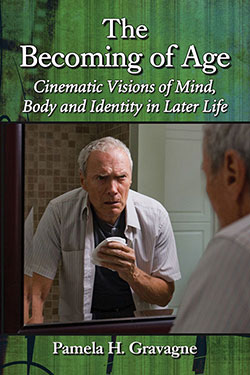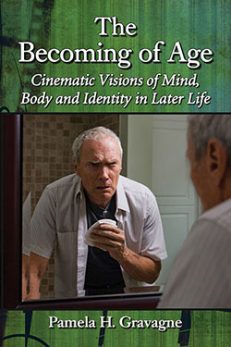The Becoming of Age
Cinematic Visions of Mind, Body and Identity in Later Life
$39.95
In stock
About the Book
The Becoming of Age is an examination of the ways that aging and old age are represented in popular film. Arguing that the ideas behind cinematic depictions of aging are historical and open to revision, the author looks at how movies both promote negative portrayals of aging and challenge its persistent cultural devaluation. Movies are a site of struggle where the representation and the reality of aging intertwine, and they have the power not only to reflect but to reconstruct our understanding.
About the Author(s)
Bibliographic Details
Pamela H. Gravagne
Format: softcover (6 x 9)
Pages: 216
Bibliographic Info: notes, bibliography, index
Copyright Date: 2013
pISBN: 978-0-7864-7260-4
eISBN: 978-1-4766-0341-4
Imprint: McFarland
Table of Contents
Table of Contents
Preface 1
Introduction 3
1. Understanding and Theorizing Aging and Old Age 11
2. Masculinities and the Narrative of Decline 37
3. The Silence and Invisibility of Older Women 65
4. Intimacy and Desire in Later Life 94
5. The Cultural Work of Alzheimer’s 131
6. Age as Becoming 158
Chapter Notes 187
Bibliography 193
Index 201
Book Reviews & Awards
“Gravagne has produced a lively and timely conversation among theoretical inquiry, popular cinema, and cultural narratives of aging”—Age Culture Humanities; “stimulating”—Journal of Popular Film and Television; “Cutting edge theory written in clear prose, The Becoming of Age delivers deft, multi-layer analyses of the ways in which aging and old age are constructed in contemporary film. Gravagne’s critique blends a wide range of critical models, brilliantly exposing layer after layer of age-based ideologies and praxis in popular films, then exploring how each film reflects, supports, and resists the ageist stereotypes of its cultural context. An impressive, illuminating investigation.”—Leni Marshall, University of Wisconsin–Stout; “This book is an eye-opening, critical engagement with the way that cinematic representations of aging have the power not only to shape but also to change the entire way we think about aging.”—Thomas Cole, University of Texas, author of The Journey of Life: A Cultural History of Aging in America; “This book is an outstanding contribution to film studies, to gerontology, and to American studies.”—Margaret Cruikshank, University of Maine, author of Learning to Be Old: Gender, Culture and Aging.





